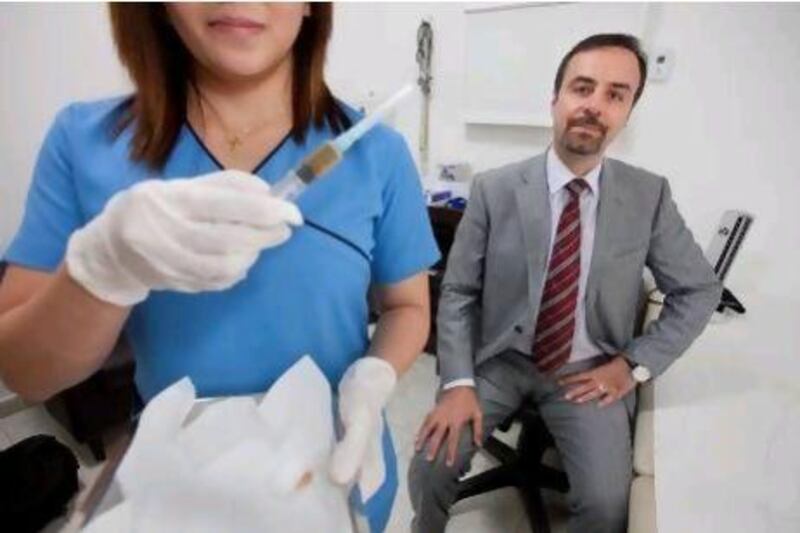Vitamin injections bring a dramatic improvement in health and appearance, but is it a safe practice? Erin McCafferty talks to a Dubai-based doctor who administers them
It's the latest trend among Hollywood celebrities in their quest to look beautiful and appear to be brimming with health. In Europe, it's popular among the general public. A surprisingly large number of people are using vitamin injections to improve not only their health but also their appearance. And a clinic in Dubai administers them.
"Vitamin injections improve your appearance and health immediately because they address a basic deficiency in the body," explains Dr Parviz Rashvand, a naturopathic doctor who administers intra-muscular vitamin injections at the Synergy Medical Clinic in Dubai.
The doctor, who is from Iran and has been practising in Dubai for the past eight years, advocates a naturistic approach to medicine. He began by studying conventional medicine but switched to dentistry and later naturopathic medicine, although he admits he's not a qualified medic in the conventional sense.
Dr Rashvand says he has people of all ages and backgrounds coming to him, sometimes for aesthetic reasons, but he only administers vitamin injections when a deficiency has been diagnosed.
"Each case is different," he explains. "Many of my patients lead unhealthy lifestyles. They want to address the problem immediately and look better, perhaps for an event they have to attend. I explain that although I can help them, the effects won't last and they need to address the underlying issues."
Dr Rashvand says he prefers intramuscular to intravenous injections.
"Vitamins in tablet form can feed existing microbes in the gut and do more harm than good, while intravenous injections are released too quickly and the result is short-lived. The most effective method, in my opinion, is to inject straight into the muscles because the vitamins are released slowly and the effects last longer. My aim is to balance vitamin levels in the body and thus improve the health of the patient in general."
The most common injections he administers are vitamins C, B or a combination of B vitamins.
"Vitamin C is safe to take because it's water soluble - any excess is excreted by the body. I find it is people who are highly stressed who are lacking in it; in situations of long-term stress, the immune system becomes compromised."
Hesta Coetzee comes to Dr Rashvand for vitamin B injections. The 40-year-old housewife from South Africa lives in Dubai and sought him out to cure a Candida infection in her stomach.
"It was making me feel depressed," she explains. "When the doctor told me I had a vitamin B deficiency, I was happy to try the injections. I couldn't take the vitamin in oral form because it would feed the bacteria. I had two high-dose vitamin B injections over two weeks and they worked wonders. I felt instantly better. My appearance improved."
But the effects did not last more than a few days. "It was a short-term fix that I needed. And the doctor addressed the Candida infection, which is now cured. I've nothing bad to say about these injections - they worked well for me."
But the question is, are they safe?
Dr Lula Sultan of the Medcare Centre, in Dubai's JBR, cautions against such injections.
"I know they are popular in certain parts of the world but these injections are often administered to people who don't need them. For example, high doses of vitamin B12 are given to people who are tired or stressed. This is not reason enough, in my opinion. A person can end up with too much of the vitamin in their body, which is not very harmful but not good, either. Also, taking the injection can be a stressful procedure.
"I believe vitamin injections should only be administered in cases where a severe vitamin deficiency has been diagnosed by a qualified doctor after standard tests."






